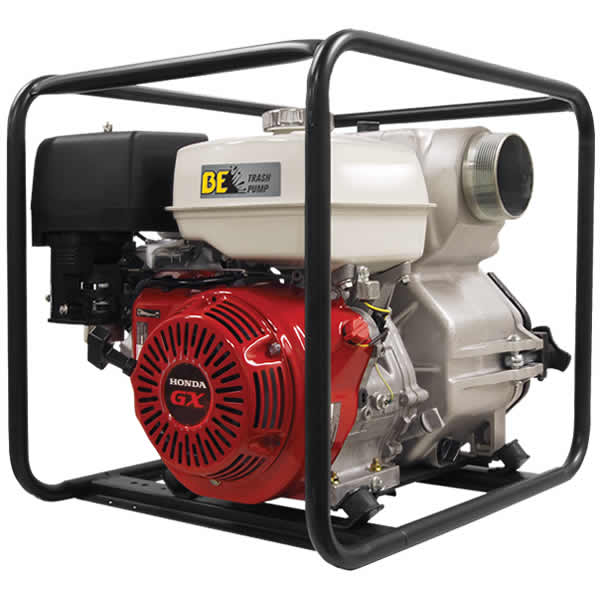
Gas Water Pump Buyer's Guide
How to Pick the Perfect Gas Water Pump
If you need to know how to move a lot of water FAST,
you're reading the right page.
Whether you're watering a field, cleaning up flooding after a major disaster, or simply want to drain your pool,
gas-powered water pumps have the strength to get the job done quickly.
Choosing the right gas-powered water pump comes down to the application you'll be using it for.
Why Choose a Gas Water Pump?


Gas water pumps are more powerful and move much more water faster than other types of pumps. For heavy-duty applications like flood removal or draining a construction site, the higher gallons per minute (GPM) and PSI ratings on gas pumps make all the difference between getting the job done in two hours or twenty minutes.
Versatility and Portability
You can take a gas-powered water pump anywhere you need it on the job site, and not rely on having electricity to power the pump. Gas water pumps are a favorite for the agricultural/farming industry because the pumps can be used to power irrigation systems or can be mounted onto tractors and other farm equipment (see PTO pumps below).
Trash pumps that run on gasoline are powerful enough to be used for pumping solids, debris, and wastewater that could come from flooding or emptying quarries that have small rocks and other materials present in the water, and are a favorite for construction companies or city municipalities.
Reliable Engines
Gas-powered water pumps come equipped with some of the most trusted engines in the industry, from Honda to Briggs, Kohler, and Generac, so you can trust in the quality of most gas water pumps.
If you need a water pump for a multitude of uses that don't involve pumping solids or debris, a great choice is a versatile dewatering pump (see below).
How to Size a Gas Water Pump
Gas water pumps can be chosen based on the intended application you need it for, and how quickly that water needs to be pumped. The most important factors in properly sizing a gas water pump come down to GPM/PSI ratings, inlet/outlet size for water and hoses, how high you'll need to pump the water, referred to as Total Head Lift (measured in vertical feet), and how far you'll need to pump the water horizontally. Lastly, remember you can NEVER use a gas water pump indoors, as carbon monoxide will build up from the exhaust fumes, a sometimes deadly consequence.
Important Features to Look for in Gas Water Pumps
There are many more options and features to choose from on these water pumps as well, from larger
inlet/outlet sizes
to
roll cages, gas tank sizes, and even features like
low-oil safety shutoff
or
self-priming pump designs
meant to save you time on the job site.
Dewatering Pump Uses
Dewatering pumps are standard gas-powered water pumps. Their job is to remove water and displace it somewhere else.
Dewatering pumps are commonly used to empty hot tubs, drain ponds or pools, and other applications for pumping relatively clean water.
With gas-powered engines, these pumps will move a lot of water quickly. If the water you need to move needs to be clean enough to drink (potable water), there are also potable
transfer pumps
available.
General-purpose dewatering pumps are great for a variety of tasks, and they're simply one of the most versatile pumps on the market for greywater transportation. However, if you need to pump water with debris or solids in it, you'll need a trash pump instead.
Trash Pump Uses
Trash pumps are built to transfer water containing debris and solids up to 2" in diameter. Trash pumps are also very versatile pumps for solids-filled water removal applications.
For pumping water with stringy weeds or lots of leaves, make sure to get a suction hose with a strainer attachment to make your life a lot easier. Read the guide linked below to learn more about how they're used.
Diaphragm Pump Uses
If the water you're pumping is primarily filled with large debris, sticks, twigs, pebbles, or anything else, we'd recommend going with
diaphragm pumps
that are meant to pump larger solids. Diaphragm pumps are the most rugged pumps around for pumping solids materials.
Chemical Pump Uses
chemical pump. Many chemical pumps employ thermoplastic parts or polypropylene housings that are corrosion-resistant and allow them to pump many types of liquid chemicals like pesticides if needed. Just remember that chemical pumps are not meant to pump flammable liquids, which could cause damage to equipment or others.
PTO Water Pumps
Although a PTO pump itself does not have a gasoline engine, it's powered by a tractor's gas engine. Power is garnered from the engine's drive-shaft, which in turn pumps the water.
Power take-off pumps are popular with farmers and large landowners as they require a tractor to operate. Harnessing the muscle of a tractor, PTO pumps are pretty much unrivaled in terms of power. Plus, with no engine to maintain, the solid construction of the pumps allows for years of quality use.

